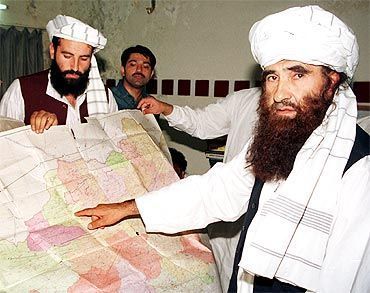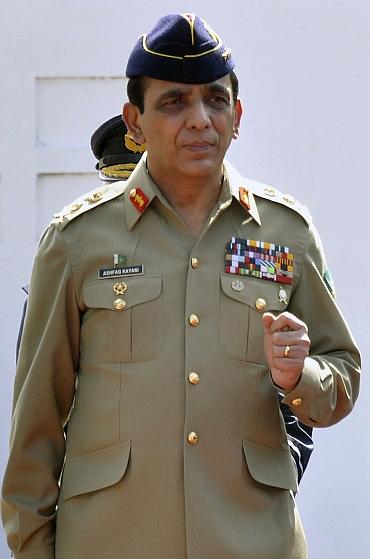 | « Back to article | Print this article |
'US ties with Pak strained at this point of time'
A top United States General has said that America's relationship with Pakistan at present is strained and Islamabad needs to take concrete steps against terrorist safe havens inside its tribal areas to improve the ties.
"It (Pakistan not taking action against safe havens) is a function probably of capacity, but it might also be a function of their hedging, whether they have determined that the United States is going to remain in Afghanistan, whether our strategy will be successful or not," Lt Gen John Allen told a Senate Committee.
"At some point, as we have emphasized to the Pakistanis, we've got to bring pressure to bear on this insurgent safe haven," said Allen, who has been nominated by President Barack Obama to replace Gen David Petraeus to head the US forces in Afghanistan.
Click NEXT to read further...
'Pak must deny the Haqqani network safe haven'
Petraeus has been nominated as the Central Investigation Agency director. "What we would hope is that they would listen to our desires for them to do that, would muster the capacity and the capability and ultimately put pressure on the Haqqani network to deny them that safe haven from which that element of Taliban can move across the border and conduct operations against the International Security Assistance Force and against the Afghan National Security Forces," he said in his confirmation hearing.
"It is both a capacity issue for the Pakistanis, and I think, potentially a willingness issue, recognising that the situation in the Federally Administered Tribal Areas is difficult for them to deal with," he pitched in for Vice Admiral McRavin, who has been nominated to be to be Admiral and Commander of the US Special Operations Command.
Allen said he would recommend to Pakistan that they take those measures that are necessary to reduce those safe havens, because in many respects they generate the opportunity for those insurgent elements to attack into Afghanistan. They've also turned out to be the safe havens that provide a springboard for the assault directly upon the Pakistani government and the Pakistani military.
"So we will encourage and will continue to encourage our Pakistani friends to bring pressure to bear upon those safe havens. It's not just good for the outcome of our strategy and for the president's vision on the outcome in Afghanistan; it's good for Pakistan as well," he said.
Click NEXT to read further...
'Though ties with Pak strained, tripartite planning committee is a bright spot'
"Our relationship with Pakistan -- while strained at this particular moment, there is a bright spot, frankly, in the many different facets of the relationship that I will touch. That bright spot is the tripartite planning committee where, on a regular basis, US, Afghan and Pakistani military officers sit down and go through the process of planning for how they will conduct cross-border operations in a way that limit the operations across the border," he said.
"So there is a bright spot in that regard, and I think it's an opportunity for us to continue through that contact to leverage our relationship with Pakistan to emphasise, as you point out correctly, Senator, the difficulties that these safe havens provide to the accomplishment of our strategy but also how they endanger Pakistan," Allen said.
The commander said he looks forward to the opportunity to work closely with Pakistani Army Chief General Ashfaq Pervez Kayani and the senior Pakistani military leadership in the context of the tripartite planning committee.
"Because, in the end, we have so many common objectives that we need to get after. I look forward to that opportunity to work with the Pakistani military," he said.


